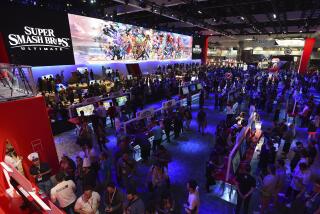E3: Still relevant in a changing market?
- Share via
With the sale of packaged video games in decline, one may wonder whether a convention like E3, which opened Monday to begin its annual celebration of the spectacle of big-budget titles, is still needed.
For the last 18 years, E3 has served as the starting gun for the industry, an extravaganza of costumed elves and orcs, provocatively clad booth attendees and video screens as tall as houses. The convention attracts more than 45,000 attendees each year for the four-day spectacle, during which more than 200 large game publishers such as Nintendo, Sony and Microsoft show off games set to hit store shelves in the coming months.
But with consumers shifting their time and dollars more toward low-budget games for smartphones and tablets as well as online and on social networks, how important is E3?
Michael Gallagher, the president of the Entertainment Software Assn. which puts on E3, argues that the show is more relevant than ever because it has been able to adapt to the changing composition of the $50-billion global video game industry.
As evidence, he cites E3’s “media impressions,” the number of times news stories are watched, seen or heard. Last year’s show generated more than 20 billion media impressions, he said, up from more than 12 billion in 2010.
In an interview, Gallagher, who served as the Department of Commerce’s assistant secretary for communications and information before he joined the ESA in 2007, outlined his case for E3’s continued relevance in a rapidly evolving industry.
Who’s coming to E3 this year?
There’s a great diversity in the types of companies represented by E3 this year. We have everyone from Activision to Zynga among the 200 exhibitors. GREE, a Japanese mobile games company, has a significant-sized booth and is making their U.S. debut at E3. What’s happened to the industry is that it’s become multi-dimensional -- from consoles to online to mobile to social. It’s all here.
Apple Inc.’s iPad and iPhones have become major destinations for games. Do you foresee a day when Apple will participate in E3?
Apple never participates in any shows other than their own. They don’t participate in CES. So we’re not surprised that they’ve chosen not to exhibit at E3, even though we think they would greatly benefit from being here. Two-thirds of the apps on iOS are games. It’s a huge driver for the Apple App Store.
What about independent game developers? Does E3 have a place for the developer that doesn’t have the marketing budget of an Activision but is making the next “Angry Birds”?
They will have a bigger place at E3 next year. This year, we sold out the show floor in record time. So the availability of space was limited. But it will be a key focus for us to have nascent companies participate in the full magnitude of E3. We’ll keep working on that.
How do you make that work economically? Some small developers would have trouble paying for a bus ticket to E3, much less pay for floor space at the show.
E3 is a high-production show, no question. It’s one of the things that makes us such a magnet for media all over the world. If you’re going to include independent developers, you want it to be consistent with the overall E3 experience, but one that’s still affordable for those developers.
One way to do that is to have a pavilion that’s underwritten by a larger company. A company that operates a platform, for example, could sponsor developers who’d be willing to make games for that platform. That would be the type of model that could work well in future years.
RELATED:
Curt Schilling takes on video games
E3: Nintendo Miiverse social network unveiled
Nintendo’s Miyamoto isn’t ready for “game over”
More to Read
From the Oscars to the Emmys.
Get the Envelope newsletter for exclusive awards season coverage, behind-the-scenes stories from the Envelope podcast and columnist Glenn Whipp’s must-read analysis.
You may occasionally receive promotional content from the Los Angeles Times.






